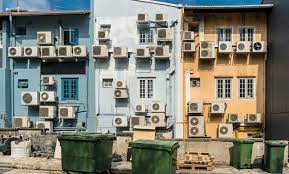While you bask in the cool comfort it offers, the unseen consequences loom large. The intricate web of how air conditioning impacts the environment is a crucial yet often overlooked topic. By peeling back the layers of this complex issue, you can uncover surprising insights that may just change the way you view your cooling habits.
Environmental Impact of Air Conditioning
Analyzing the environmental impact of air conditioning reveals significant electricity consumption and carbon dioxide emissions. Cooling systems contribute to climate implications through their environmental consequences. The sustainability concerns tied to air conditioning stem from its high energy consumption, which strains electricity grids and intensifies carbon dioxide release. Globally, air conditioning accounts for 117 million metric tons of carbon dioxide emissions annually, exacerbating the challenges of climate change. Such energy-intensive practices highlight the urgent need for eco-friendly alternatives and energy-efficient solutions in the air conditioning sector. Homeowners’ annual expenditure of approximately $29 billion on air conditioning underscores the magnitude of the issue. As the demand for air conditioning rises, the reliance on non-renewable energy escalates, further heightening environmental impact. Mitigating these effects necessitates a shift towards energy-efficient practices, alternative refrigerants with lower warming potentials, and sustainable maintenance approaches to alleviate the strain on the environment and combat climate change effectively.
Challenges in Refrigerant Management
Refrigerant management poses critical challenges in the air conditioning industry due to the environmental impact of refrigerants and their contribution to global warming. Proper refrigerant disposal is essential to reduce emissions and minimize the industry’s carbon footprint. Global cooperation is crucial in developing effective regulations that promote the use of climate-friendly alternatives and ensure responsible handling of refrigerants. Climate-friendly alternatives play a significant role in emissions reduction, with the potential to mitigate the adverse effects of traditional refrigerants. Effective regulations are necessary to enforce the proper management of refrigerants, encouraging the adoption of sustainable practices across the industry. By prioritizing refrigerant disposal, emissions reduction, global cooperation, climate-friendly alternatives, and effective regulations, the air conditioning sector can work towards a more environmentally sustainable future. Your involvement in supporting these initiatives can contribute to the industry’s efforts in combating climate change and protecting the environment.
Role of Energy Efficiency Standards
The significance of energy efficiency standards in air conditioning systems lies in their pivotal role in reducing environmental impact and promoting sustainability. Efficiency regulations such as SEER and EER ratings are crucial for minimizing energy consumption and addressing environmental implications. By adhering to these standards, air conditioning units can operate more efficiently, thus reducing their carbon footprint and mitigating climate concerns. Implementing sustainable measures like using alternative refrigerants with lower warming potentials and prioritizing system maintenance can further enhance the eco-friendliness of air conditioning systems. The Department of Energy plays a vital role in setting and updating these efficiency standards to ensure HVAC systems meet stringent criteria for energy efficiency. As new testing procedures for split system air conditioners are set to begin in 2023, the focus remains on continuously improving the efficiency of air conditioning systems to support sustainability efforts and combat climate change.
Impact on Carbon Footprint
Air conditioning systems significantly impact carbon footprints through their electricity consumption and emissions of carbon dioxide. To address this, various strategies can be implemented to reduce carbon emissions and mitigate environmental harm. Incorporating renewable energy sources into air conditioning systems can significantly decrease carbon footprints. Green technology innovations such as energy-efficient cooling systems and alternative refrigerants with lower warming potentials play a vital role in minimizing environmental impact. Climate change mitigation efforts are crucial, and proper environmental footprint analysis can guide decisions towards more sustainable practices. By focusing on carbon emissions reduction, renewable energy integration, green technology innovation, climate change mitigation, and environmental footprint analysis, individuals and businesses can make a substantial positive impact on the environment.
| Strategies for Sustainability | Benefits |
|---|---|
| Renewable Energy Integration | Decreased Carbon Footprint |
| Green Technology Innovation | Environmental Conservation |
| Climate Change Mitigation | Sustainable Practices |
Importance of Proper Maintenance
Proper maintenance of air conditioning systems significantly impacts their efficiency and environmental footprint. Maintenance benefits include prolonging the lifespan of the system, ensuring optimal performance, and reducing the risk of refrigerant leaks that can harm the environment. By regularly servicing your air conditioner, you contribute to energy savings, as a well-maintained system operates more efficiently, consuming less electricity. This, in turn, reduces the carbon dioxide emissions associated with electricity production. Engaging in proper maintenance practices showcases your environmental responsibility by minimizing the ecological impact of your cooling system. Sustainability benefits are also apparent, as a well-maintained air conditioner aligns with eco-friendly practices and helps in conserving resources. Prioritizing maintenance not only enhances the longevity and performance of your air conditioning unit but also plays a vital role in promoting energy efficiency and reducing your carbon footprint. Embrace proper maintenance as a cornerstone of your commitment to environmental stewardship.
Sustainable Cooling Practices
Pivoting from the importance of proper maintenance, optimizing sustainable cooling practices is imperative for reducing environmental impact and enhancing energy efficiency. Embracing green technologies and eco-friendly innovations is vital in achieving sustainable cooling solutions. Climate solutions play a crucial role in mitigating the environmental footprint of air conditioning systems. Prioritizing sustainable cooling methods contributes to environmental stewardship and promotes a healthier planet for future generations. Implementing energy-efficient practices and adopting alternative refrigerants are key steps towards reducing the negative effects of air conditioning on the environment.
- Incorporating green technologies into cooling systems
- Exploring eco-friendly innovations for sustainable cooling
- Implementing climate solutions to reduce environmental impact
- Prioritizing sustainable cooling practices for environmental stewardship
- Adopting energy-efficient methods to enhance energy efficiency
Regulatory Efforts for Sustainability
Implementing stringent regulatory measures is crucial for ensuring sustainability in the air conditioning industry. Policy compliance is a key aspect of fostering sustainable practices within the sector. Regulatory advancements play a vital role in promoting environmental stewardship and climate initiatives. By adhering to strict regulations and standards, companies can minimize their negative impact on the environment. Compliance with environmental policies not only benefits the planet but also contributes to the long-term viability of the air conditioning market. Companies that prioritize sustainability through regulatory efforts demonstrate a commitment to reducing their carbon footprint and promoting eco-friendly practices. Through proactive engagement with regulatory bodies and participation in climate initiatives, the air conditioning industry can align its operations with global environmental goals. Embracing regulatory measures for sustainability is not only a responsibility but also an opportunity to drive positive change and contribute to a greener future.
Future of Air Conditioner Technology
To ensure sustainability in the air conditioning industry, advancements in technology are pivotal for shaping the future of air conditioner technology.
- Smart cooling: Integration of smart technologies for efficient cooling operations.
- Eco-friendly innovations: Development of environmentally friendly refrigerants and materials.
- Sustainable solutions: Implementing long-lasting and energy-efficient cooling systems.
- Climate-conscious design: Designing air conditioners with reduced carbon footprint.
- Green technology advancements: Incorporating cutting-edge green technologies for enhanced performance and eco-friendliness.
The future of air conditioner technology lies in embracing smart cooling strategies, eco-friendly innovations, sustainable solutions, climate-conscious design principles, and the continuous advancement of green technologies. By focusing on these areas, the air conditioning industry can move towards a more environmentally sustainable future, minimizing its impact on the planet while still providing the necessary comfort and cooling solutions for homes and businesses.


